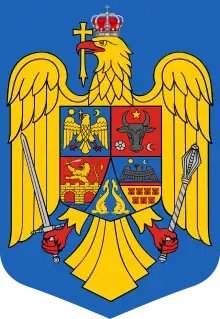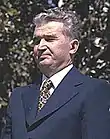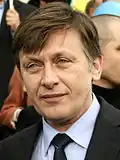List of presidents of Romania
The President of Romania serves as the head of state of Romania. The office was created by the Communist leader Nicolae Ceaușescu in 1974 and has developed into its modern form after the Romanian Revolution and the adoption of the 1991 constitution. The current president of Romania is Klaus Iohannis, who has been serving since 21 December, 2014.
 |
|---|
| This article is part of a series on the politics and government of Romania |
List
- Political parties
Romanian Communist Party (PCR)
National Salvation Front (FSN)
Social Democratic Party (PSD)
Christian Democratic National Peasants' Party (PNȚCD)
Democratic Liberal Party (PDL)
National Liberal Party (PNL)
Socialist Republic of Romania (1965–1989)
| Nº | Portrait | Name (Birth–Death) |
Election | Term of office | Political Party | Ref. | ||
|---|---|---|---|---|---|---|---|---|
| Took office | Left office | Time in office | ||||||
| 1 |  |
Nicolae Ceaușescu (1918–1989) |
1974 | 28 March 1974 | 22 December 1989 | 19 years,
249 days |
Romanian Communist Party (PCR) | [1] |
| Ceaușescu maintained his country under a communist state. Despite his country's membership in the Warsaw Pact, Ceaușescu recognised the state of Israel, supported Romanian nationalism, and denounced the 1968 Warsaw Pact invasion of Czechoslovakia. With his 1971 July Theses speech, Ceaușescu launched a quasi-Maoist and Neo-Stalinist reform. He and his wife were deposed during the 1989 Romanian Revolution and were executed three days later. | ||||||||
Romania (1989–present)
| Nº | Portrait | Name (Birth–Death) |
Election | Term of office | Political Party | Ref. | ||
|---|---|---|---|---|---|---|---|---|
| Took office | Left office | Time in office | ||||||
| — | .jpg.webp) |
Ion Iliescu (born 1930) |
— | 26 December 1989 | 20 June 1990 | 176 days | National Salvation Front (FSN) | [2] |
| A former Romanian Communist Party (PCR) member, Iliescu was one of the founders of the National Salvation Front (FSN) during the 1989 Revolution. As a member of the FSN Triumvirate, Iliescu served as the acting head of state of Romania for almost six months during its transition to capitalism. | ||||||||
| 2 | 1990 | 20 June 1990 | 29 November 1996 | 6 years,
161 days |
National Salvation Front (FSN) | [2] | ||
| The first president to have been freely and democratically elected, Iliescu was an "independent social democrat." He earned a populistic reputation after his handling of the Mineriad's miner interventions in Bucharest. Under his first term, the current Constitution of Romania was introduced. | ||||||||
| 3 |  |
Emil Constantinescu (born 1939) |
1996 | 29 November 1996 | 20 December 2000 | 4 years,
21 days |
Christian Democratic National Peasants' Party (PNȚCD)1 | |
| Constantinescu was the successful candidate of the right-leaning Romanian Democratic Convention (CDR) which won the 1996 general elections, consequently paving the way for the first peaceful transfer of power in post-1989 Romania. During his term as president, Constantinescu struggled with the slow implementation of the modernization and privatization process which was bogged down by excessive bureaucracy.
Nonetheless, the CDR coalition managed to secure three prime ministers who initiated liberalizing economic reforms under Constantinescu's presidency, although the overall progress on a short-term basis was slower than expected. | ||||||||
| (2) | _(cropped).jpg.webp) |
Ion Iliescu (born 1930) |
2000 | 20 December 2000 | 20 December 2004 | 4 years | Social Democratic Party (PSD) | [2] |
| Iliescu was elected to his third non-consecutive term in 2000. In March, 2004, at the end of his last term, Romania joined the North Atlantic Treaty Organization, as part of the second largest wave of expansion in Central and Eastern Europe. | ||||||||
| 4 | _(cropped_2).jpg.webp) |
Traian Băsescu (born 1951) |
2004 | 20 December 2004 | 21 December 2014 | 10 years,
1 day |
Democratic Liberal Party (PDL)2 | |
| Elected with the support of the right-leaning Justice and Truth Alliance (D.A.), Băsescu won the presidency in 2004 on a platform targeting widespread political corruption. During his first term, Romania joined in the European Union. It was also during his first mandate as president that he managed to solve a hostage crisis in Iraq, resulting in the rescue of three Romanian journalists. In spite of the harsh opposition of the left-leaning parties (especially the PSD), he publicly condemned the former Communist regime.
His second term was marked by a landslide victory of the opposition coalition, specifically the Social Liberal Union (USL), in both the local and the legislative elections of 2012, amidst heavy losses for the presidential party (i.e. the Democratic Liberal Party). Internationally, Băsescu aligned Romania closer to the United States, the European Union, and NATO, maintaining a pro-Western foreign policy throughout both his terms. He was suspended twice, namely in 2007 and 2012. Both impeachment referenda were invalidated by the Constitutional Court on the grounds of low turnout, thus paving his way for a comeback to presidency. | ||||||||
| 5 | .jpg.webp) |
Klaus Iohannis (born 1959) |
2014 | 21 December 2014 | Incumbent | 6 years, 44 days | National Liberal Party (PNL) | [3] |
Notes:
1 Emil Constantinescu was the candidate of the Christian Democratic National Peasants' Party (PNȚCD) whose candidacy was supported as part of the larger right-leaning Romanian Democratic Convention (CDR) in both 1992 and 1996;
2 Traian Băsescu was the presidential candidate of the Democratic Party (PD) whose candidacy was supported as part of the larger right-leaning Justice and Truth Alliance (D.A.) in 2004, alongside the National Liberal Party. In 2009 his re-election was supported only by the Democratic Liberal Party (PDL) along with a certain faction of the Christian Democratic National Peasants' Party (PNȚCD).
Acting presidents (1990–present)
| Nº | Portrait | Name (Birth–Death) |
Term of office | Political Party | ||
|---|---|---|---|---|---|---|
| Took office | Left office | Time in office | ||||
| — | .jpg.webp) |
Nicolae Văcăroiu (born 1943) |
20 April 2007 | 23 May 2007 | 33 days | Social Democratic Party (PSD) |
| Văcăroiu, the president of the Senate, served as interim president following Băsescu's first impeachment. | ||||||
| — |  |
Crin Antonescu (born 1959) |
10 July 2012 | 27 August 2012 | 48 days | National Liberal Party (PNL) |
| Antonescu, the president of the Senate, served as interim president following Băsescu's second impeachment. | ||||||

See also
Footnotes and references
- Grosescu, R. (2004). The Political Regrouping of Romanian Nomenklatura during the 1989 Revolution. Romanian Journal of Society and Politics, 4(1), 97-123.
- Rulers.org
- "Klaus Iohannis wins Romanian presidential election". The Guardian. November 16, 2014. Archived from the original on November 17, 2014. Retrieved November 17, 2014.
- Bulei, Ion, O istorie a românilor, Editura Meronia, Bucureşti, 2007, pg. 266-267